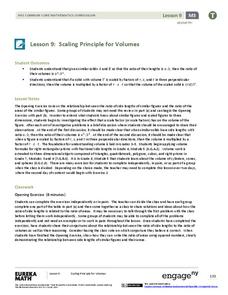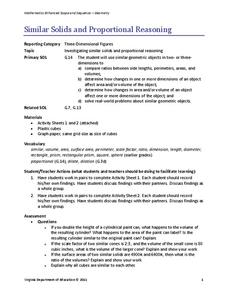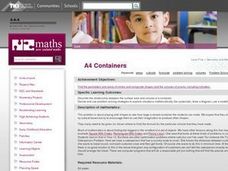EngageNY
The Volume of Prisms and Cylinders and Cavalieri’s Principle
Young mathematicians examine area of different figures with the same cross-sectional lengths and work up to volumes of 3D figures with the same cross-sectional areas. The instruction and the exercises stress that the two...
Virginia Department of Education
Surface Area and Volume
Partners use materials to wrap three-dimensional objects to determine the formula for surface area. The groups use an orange to calculate the amount of peel it takes to completely cover the fruit. Using manipulatives, individuals then...
Virginia Department of Education
Exploring 3-D Geometry
Take young mathematicians on an exploration of the world of 3-D geometry with this seven-lesson unit. After first defining the terms perimeter, area, and volume and how they apply to the real world, students continue on...
EngageNY
Scaling Principle for Volumes
Review the principles of scaling areas and draws a comparison to scaling volumes with a third dimensional measurement. The exercises continue with what happens to the volume if the dimensions are not multiplied by the same...
Virginia Department of Education
Similar Solids and Proportional Reasoning
Double the dimensions, quadruple the surface area. Pairs build similar prisms and compare the ratios of their surface areas and volumes to the ratio of the heights. Given two similar cones, partners determine the ratios of the lateral...
Curated OER
A4 Containers
Fifth graders determine which container made from a single sheet of paper has the greatest volume. They look the solutions made by three different students before working on their own examples.





